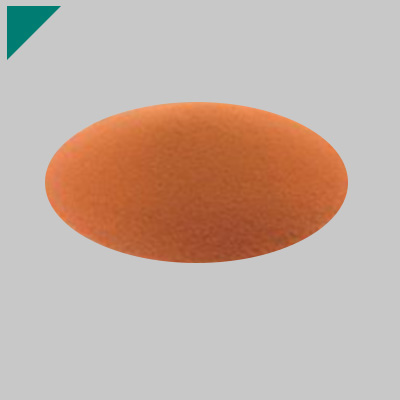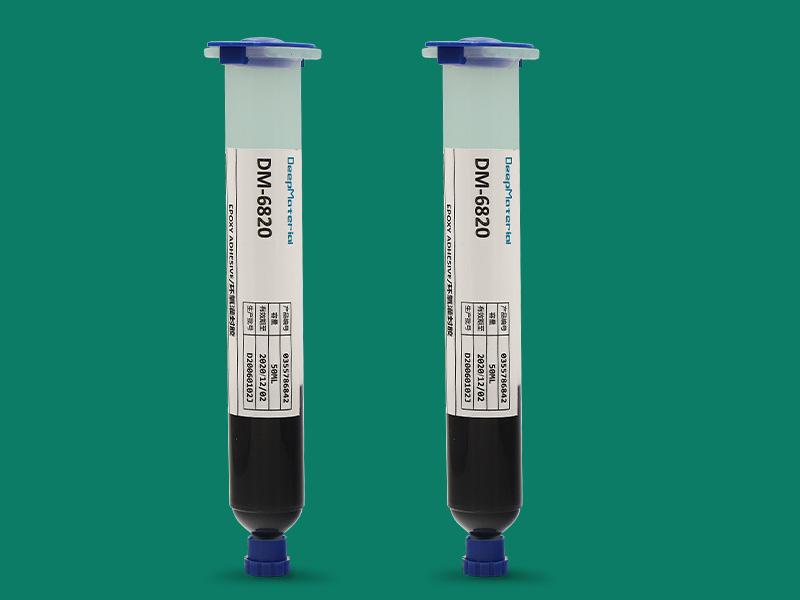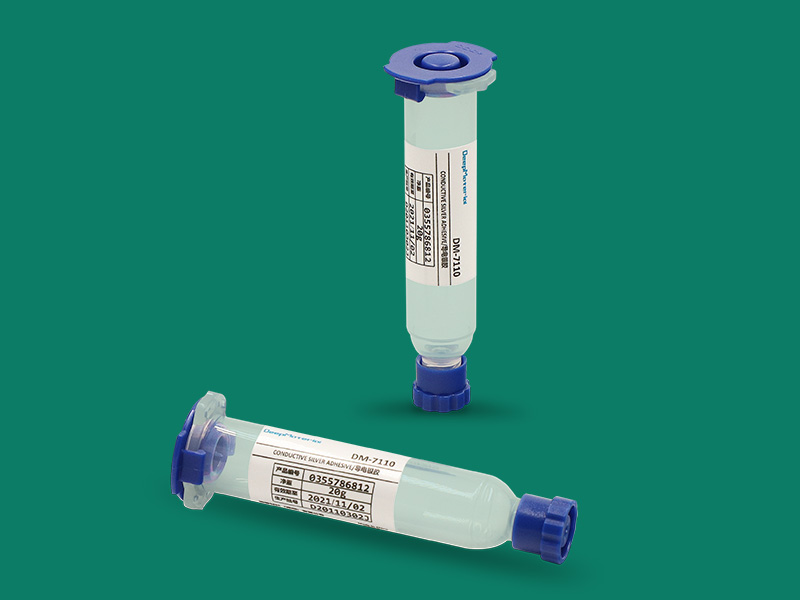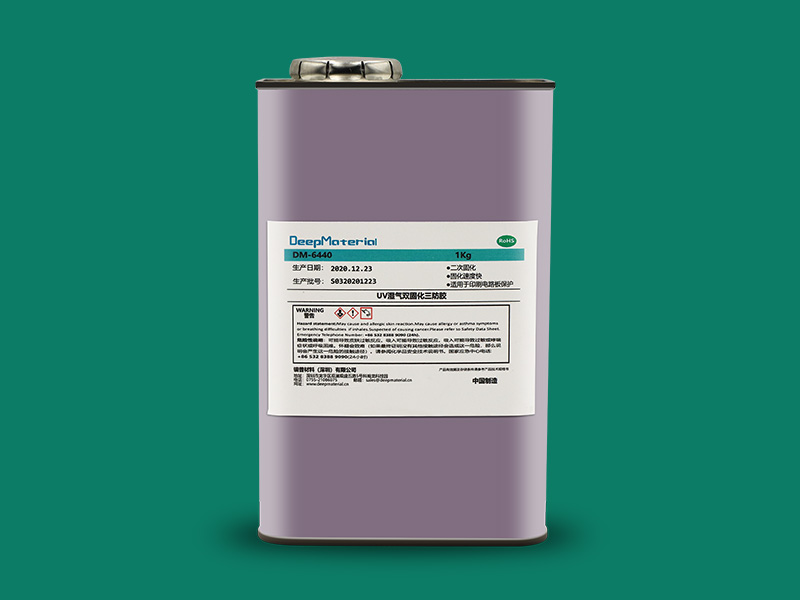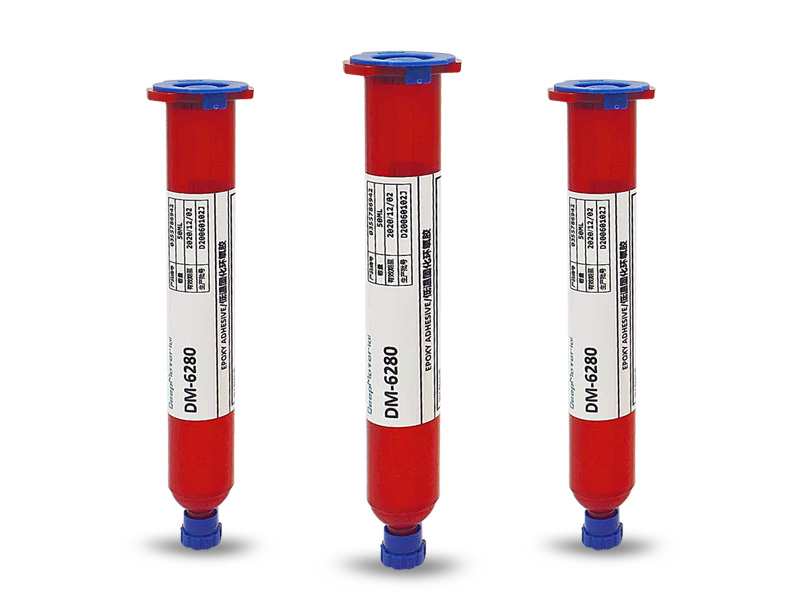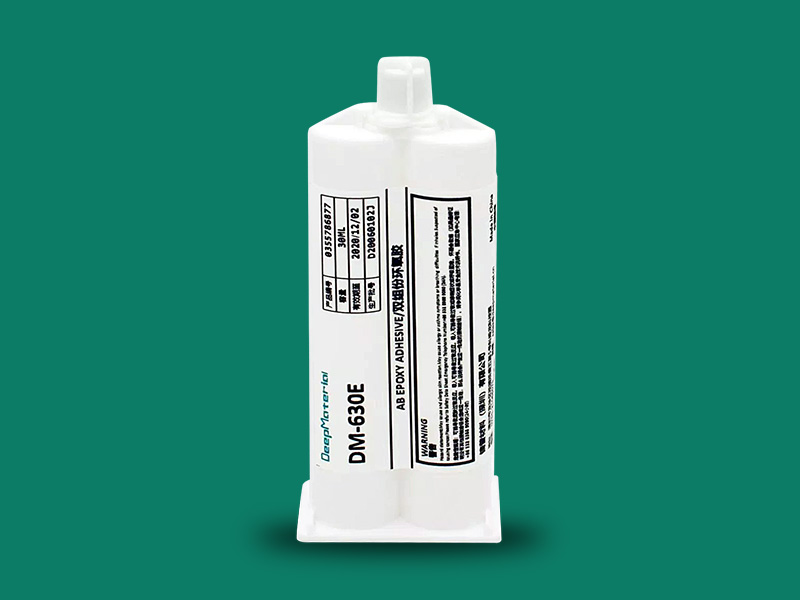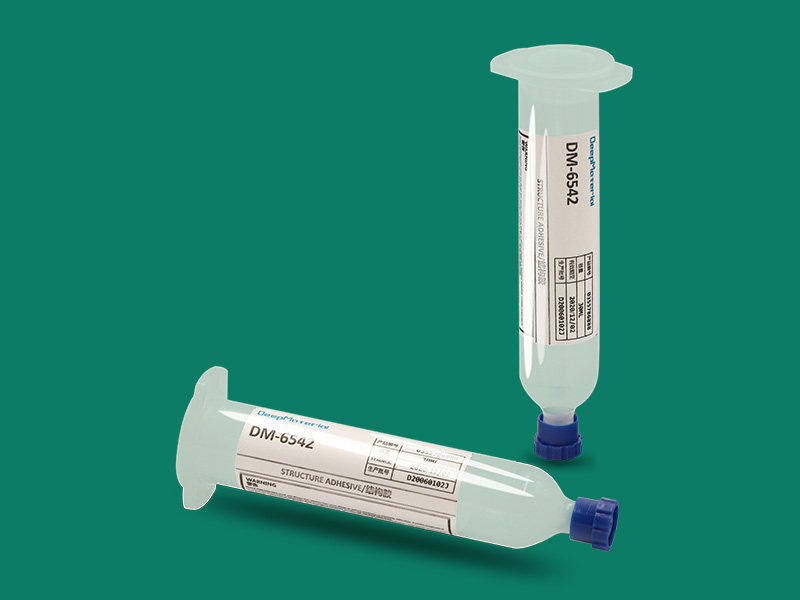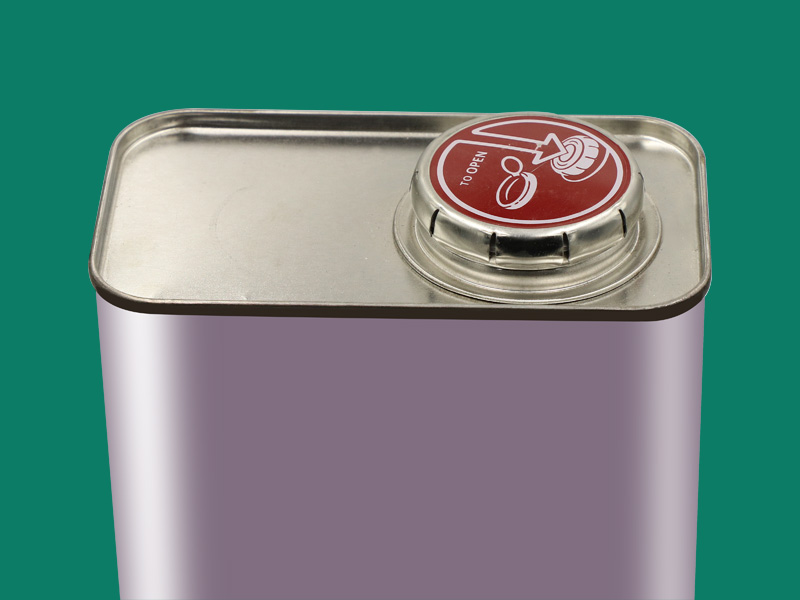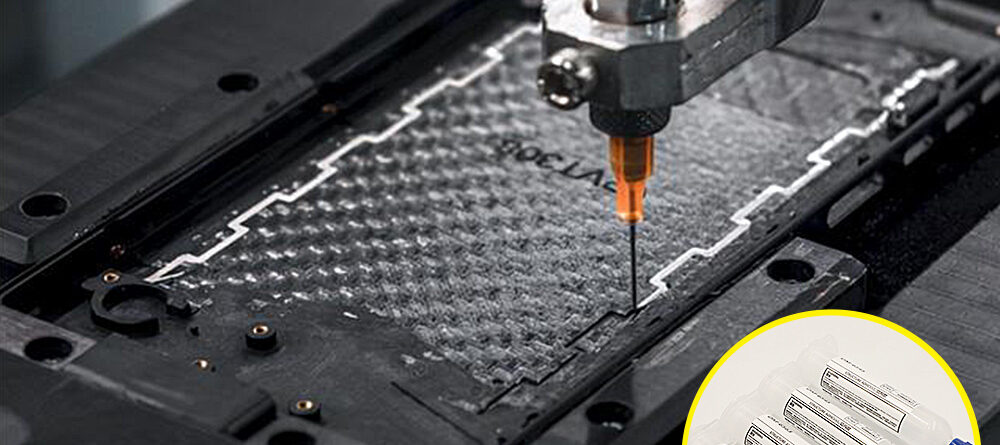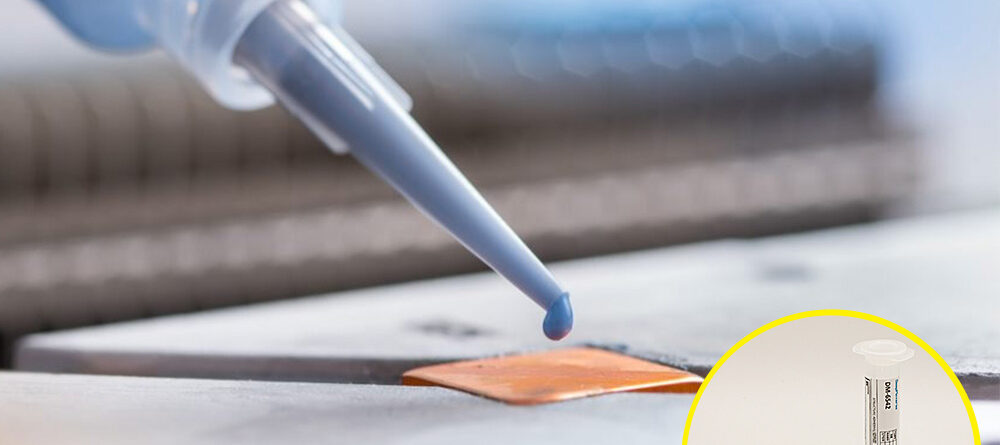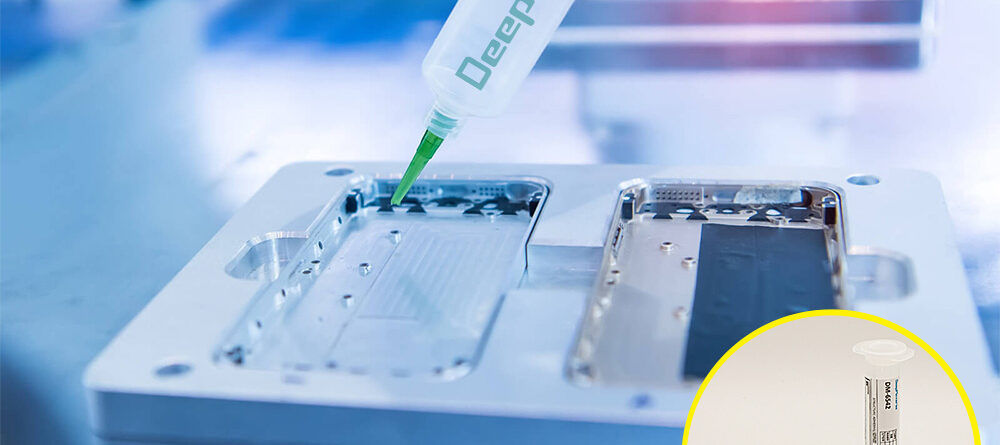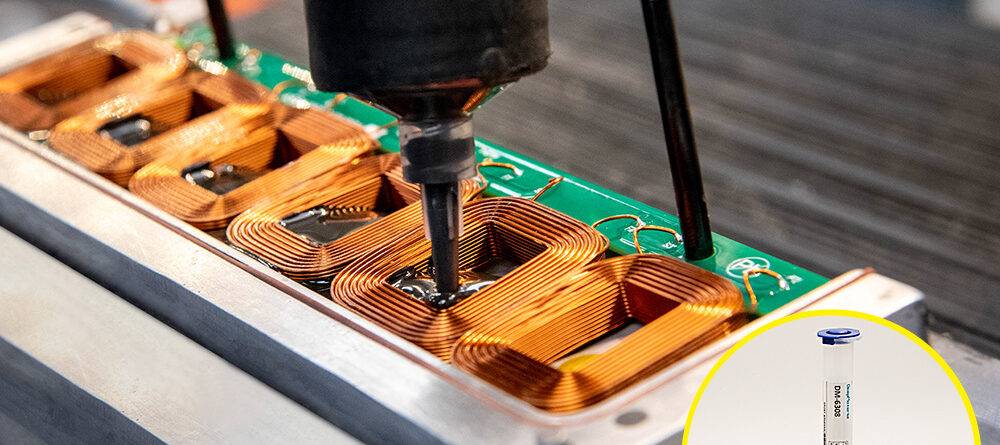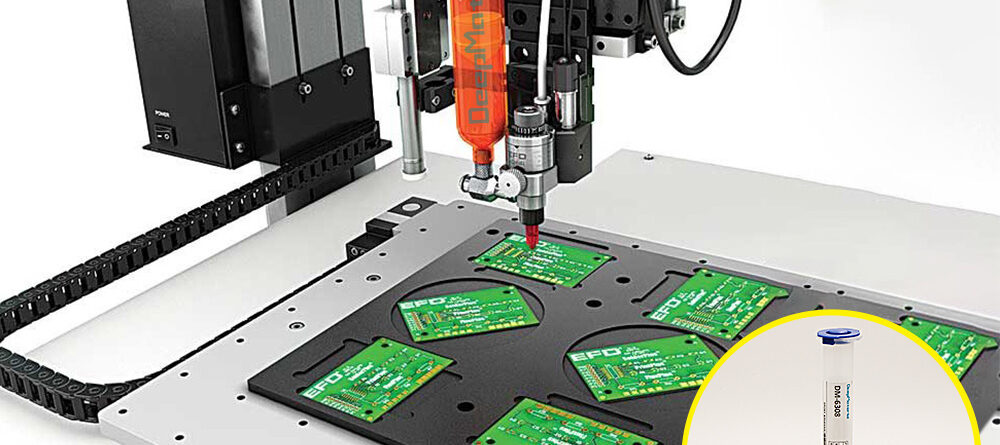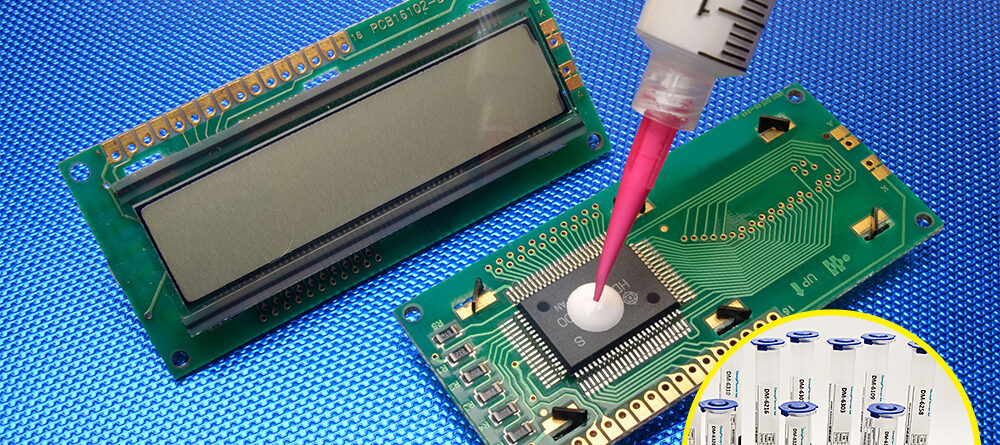Best epoxy adhesive for metal to metal,plastic and glass

Shenzhen DeepMaterial Technologies Co., Ltd is industrial epoxy adhesive suppliers and epoxy resin manufacturers in china,manufacturing best strongest epoxy adhesive glue for metal to metal,plastic,glass and concrete,high temperature epoxy for plastic,industrial strength epoxy glue,best thermally conductive epoxy,low temperature epoxy adhesive,electronic epoxy encapsulant potting compounds and so on.
Epoxy adhesives are high-performance adhesives often used in carpentry and woodworking or for specialized creative uses like making costume jewelry. These practices include not only wood, but also metal in some instances such as handrails, table legs or doorhandles. Epoxies come in different types with different properties: flexible or rigid, transparent or opaque, fast or slow setting. They also offer high resistance to heat and chemicals.
The best epoxy for metal is Deepmaterial best strongest epoxy adhesive glue for metal to metal,plastic,glass and concrete, a one part system consisting of an epoxy resin and a hardener. The resin and hardener are combined to create a durable, high-strength bond that dries in minutes and can be used for repairing, filling, and rebuilding all metal and concrete surfaces.
When it comes to bonding metal surfaces, the epoxy adhesive has become a popular choice due to its impressive bonding strength and durability. When using epoxy adhesive for metal, the glue mixes two components, the resin, and the hardener. When these components are combined, they create a chemical reaction that produces a robust and durable bond.
This guide covers the benefits, compatibility, waterproof and heat-resistant properties, application techniques, safety, removal, shelf life, and purchasing an epoxy adhesive for metal. Read on to learn everything you need about epoxy adhesive for metal.
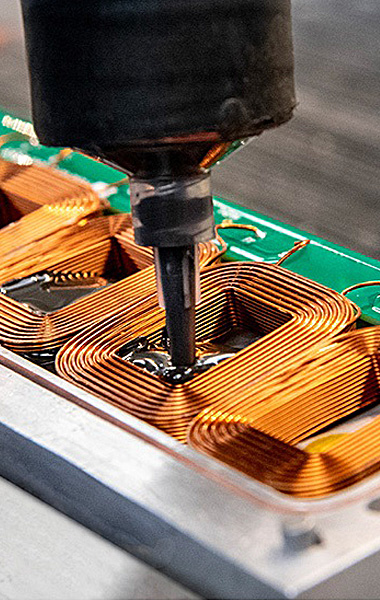
Everything About Best Epoxy Adhesive For Metal
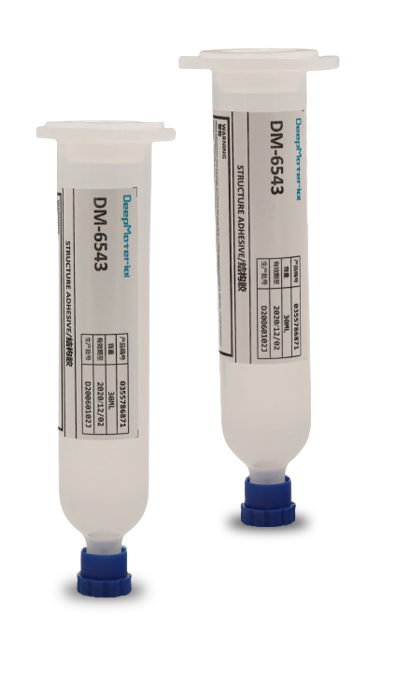
Understanding Epoxy Adhesive For Metal
The quality of epoxy adhesives can vary significantly, and it is crucial to understand their differences to choose the most suitable adhesive for bonding metal according to your specific requirements.
The first thing to consider when selecting an epoxy adhesive for metal is the type of metal you are bonding. Epoxy adhesive manufacturers design certain types of epoxy adhesives specifically for use with particular metals, such as aluminum or stainless steel. Manufacturers also produce epoxy adhesives that possess more versatility, enabling them to be utilized with various metals.
The next consideration is the strength of the bond required. Some epoxy adhesives are designed for high-stress applications and provide a strong bond, while others are more suitable for low-stress applications.
Considering the temperature and environmental conditions to which the bonded metal will be exposed is also crucial. Selecting a specific epoxy adhesive that can withstand the particular requirements is vital because certain epoxy adhesives have better resistance to heat and chemicals than others.
Appropriately preparing the surfaces for metal bonding when using epoxy adhesive is crucial. A crucial step in metal bonding with epoxy adhesive is to clean and degrease the surfaces before bonding to eliminate any dirt, oil, or other contaminants that may interfere with the bonding process.
Additionally, following the manufacturer’s instructions for mixing and applying the epoxy adhesive is essential. Following specific guidelines, such as using a particular mixing ratio, applying the glue within a specific temperature range, and allowing adequate time for curing before using the bonded metal, is crucial to ensure proper metal bonding with epoxy adhesive.

How Epoxy Adhesive For Metal Works
Epoxy adhesives are widely used in metalworking applications because they provide a robust, long-lasting bond that can withstand harsh environments and heavy loads. Here are some ways epoxy adhesive for metal works:
Bonding: Manufacturers produce epoxy adhesive for metal as an effective bonding agent to join two metal surfaces together. Applying the glue to the metal surface and joining the two characters together creates a robust and enduring bond through the adhesive.
Filling: Epoxy adhesive for metal can fill gaps and cracks in metal surfaces. The bond is applied to the damaged area and left to dry, creating a reliable and durable repair.
Sealing: Epoxy adhesive for metal can seal metal surfaces, preventing water, air, and other substances from penetrating the metal. The bond creates a waterproof and airtight seal that can withstand harsh environments.
Coating: One can use epoxy adhesive for metal as a coating to shield metal surfaces from damage caused by corrosion, rust, and other sources. The adhesive is applied to the surface of the metal, creating a protective barrier that can withstand exposure to chemicals, moisture, and UV light.
Grinding: The metalworking industry can use epoxy adhesive for metal as a grinding aid. The bond is applied to the metal surface to help reduce friction and heat generated during grinding. Using epoxy adhesive for metal as a grinding aid can help to prevent the metal from overheating and warping, which results in a smoother and more precise finish.
Machining: In machining operations, using epoxy adhesive for metal as a lubricant is possible. Applying the bond of an epoxy adhesive for metal to either the cutting tool or the machined metal surface can reduce friction and heat, resulting in a smoother finish and improved tool life.
Thread locking: Epoxy adhesive for metal can be used as a thread locker to prevent nuts and bolts from loosening due to vibration or other factors. The adhesive is applied to the fastener threads before assembly, creating a solid and permanent bond that can withstand heavy loads and harsh environments.
Structural bonding: Epoxy adhesive for metal is suitable for structural applications that require high-strength and permanent bonding. Industries such as aerospace and automotive often use epoxy adhesive for metal to bond metal components due to the critical nature of safety and reliability.
Benefits Of Epoxy Adhesive for Metal
Epoxy adhesive offers numerous benefits, making it an ideal choice for bonding, sealing, filling, and coating metal surfaces. Here we will discuss some of the benefits of an epoxy adhesive for metal.
Strong and Durable Bond: Epoxy adhesive for metal creates a solid, durable bond that can withstand harsh environments and heavy loads. It can bond different metals, including steel, aluminum, and copper, providing a permanent and reliable bond.
Easy to Apply: Epoxy adhesive for metal is easy to apply and can be used on various surfaces. It can be applied using a brush, roller, or spray gun, making it a flexible solution for different applications.
Resistant to Chemicals and Corrosion: Epoxy adhesive for metal is resistant to chemicals, corrosion, and other forms of damage. It can withstand exposure to harsh chemicals, moisture, and UV light, making it an ideal choice for applications that require protection against these elements.
Versatile: Epoxy adhesive for metal can be used for bonding, filling, sealing, and coating metal surfaces. Epoxy adhesive for metal is also applicable in repairing damaged metal parts, making it an affordable and practical solution for mending equipment and machinery.
Temperature Resistant: Epoxy adhesive for metal can withstand extreme temperatures, making it an ideal choice for applications that require heat resistance. It can withstand temperatures up to 500°F, making it suitable for high-temperature environments.
Long-Lasting: Epoxy adhesive for metal creates a stable bond lasting for years. It does not shrink or crack over time, providing a reliable and durable solution for metalworking applications.
Strength Of Epoxy Adhesive for Metal
Epoxy adhesive for metal is widely known for its strength and durability. It is a two-part adhesive composed of a resin and a hardener that, when combined, creates a strong and permanent bond. Here we will discuss the strength of epoxy adhesive for metal and why it is a popular choice for bonding metal surfaces.
High Tensile Strength: Epoxy adhesive for metal has a high tensile strength, which means it can withstand pulling or stretching forces without breaking. The strength and durability of the bond achieved with epoxy adhesive make it a desirable choice for applications that require such qualities.
Excellent Shear Strength: Epoxy adhesive for metal also has incredible shear strength, which means it can withstand forces that try to slide or shear the bond. The strong and stable epoxy adhesive bond makes it an ideal choice for applications that demand these properties.
Good Impact Resistance: Epoxy adhesive for metal has good impact resistance, which means it can withstand sudden impacts without breaking. The solid and resilient bond offered by epoxy adhesive makes it suitable for applications necessitating these characteristics.
Resistant to Fatigue: Epoxy adhesive for metal is also resistant to fatigue, which means it can withstand repeated stress cycles without breaking. The long-lasting and reliable bond provided by epoxy adhesive makes it a preferable choice for applications that demand these traits.
Versatile: Epoxy adhesive for metal is a versatile adhesive that can bond different types of metals, including steel, aluminum, and copper. It can also connect metal to other materials, such as plastics and composites.
Long-Lasting: Epoxy adhesive for metal creates a stable bond that can withstand harsh environments and heavy loads. It does not shrink or crack over time, providing a reliable and durable solution for metalworking applications.
Types Of Metals Compatible With Epoxy Adhesive
Epoxy adhesive is compatible with many metals, including steel, aluminum, copper, etc. Here we will discuss the types of metals compatible with epoxy adhesive.
Steel: Different types of steel, including carbon steel, stainless steel, and galvanized steel, can be effortlessly bonded and repaired using epoxy adhesive, making it a compatible option for manufacturers who frequently utilize steel in production.
Aluminum: Epoxy adhesive can effectively bond aluminum, widely used in the aerospace, automotive, and construction industries. Epoxy adhesive is ideal for connecting and repairing aluminum parts due to its excellent adhesion and strength.
Copper: Epoxy adhesive is also compatible with copper, widely used in electrical and plumbing applications. Epoxy adhesive is an ideal choice for bonding and repairing copper parts due to its excellent adhesion and resistance to corrosion.
Brass: The manufacturing of musical instruments, plumbing fixtures, and decorative hardware commonly utilizes brass, which epoxy adhesive can effectively bond. Epoxy adhesive is an ideal choice for bonding and repairing brass parts due to its excellent adhesion and resistance to corrosion.
Bronze: Industries manufacturing sculptures, decorative items, and bearings widely use bronze, and they can effectively bond it using epoxy adhesive. Epoxy adhesive is an ideal choice for bonding and repairing bronze parts due to its excellent adhesion and strength properties.
Nickel: Manufacturers in the electronics, aerospace, and jewelry industries widely use nickel, which can bond effectively with epoxy adhesive. Epoxy adhesive is an ideal choice for bonding and repairing nickel parts due to its excellent adhesion and resistance to corrosion.
Metal Bonding Epoxy Adhesive Compatibility With Non-Metal Surfaces
Epoxy adhesives are not limited to metal surfaces; they can also bond effectively with non-metal characters. Here we will discuss the compatibility of epoxy adhesives with non-metal surfaces.
Plastics: Epoxy adhesives are compatible with different types of plastics, including PVC, ABS, polycarbonate, and many others. Epoxy adhesive is ideal for bonding and repairing plastic parts due to its excellent adhesion and strength.
Ceramics: Epoxy adhesives are also compatible with ceramics, including porcelain, earthenware, and stoneware. Epoxy adhesive is an ideal choice for bonding and repairing ceramic parts due to its excellent adhesion and resistance to heat and moisture.
Composites: Epoxy adhesives are also compatible with composites widely used in the aerospace and automotive industries. Epoxy adhesive is an ideal choice for bonding and repairing composite parts due to its excellent adhesion and strength properties.
Wood: The construction and furniture industries widely use epoxy adhesives compatible with wood. Epoxy adhesive is ideal for bonding and repairing wood parts due to its excellent adhesion and strength.
Glass: Manufacturers widely use glass in the manufacturing of electronics, lighting fixtures, and automotive parts, and it is compatible with epoxy adhesives. Epoxy adhesive is an ideal choice for bonding and repairing glass parts due to its excellent adhesion and resistance to moisture and heat.
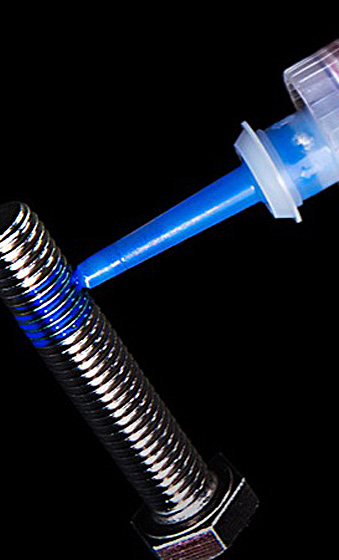
Waterproof Properties Of Epoxy Adhesive For Metal
Its excellent waterproof properties make it a preferred choice for bonding, sealing, and coating metal surfaces. Here we will explore the waterproof properties of an epoxy adhesive for metal and how it can benefit different industries.
Epoxy adhesive is highly resistant to water, making it ideal for applications that require waterproofing properties. It can withstand prolonged moisture exposure, making it a perfect choice for marine environments and outdoor applications. It is also highly resistant to chemicals, including acids, alkalis, and solvents, which makes it an ideal choice for chemical processing plants.
In addition to its waterproof properties, epoxy adhesive for metal has excellent corrosion resistance properties. It can prevent the formation of rust and other types of corrosion on metal surfaces, which can significantly extend the lifespan of the bonded parts. Industries expect exposure to moisture, chemicals, or corrosive substances in specific applications, and the excellent waterproof properties of epoxy adhesive become particularly important in such cases.
Epoxy adhesive for metal is also highly durable and can withstand extreme temperatures, shocks, and vibrations. Aerospace and military industries commonly use it, where high durability and resistance to harsh conditions are essential.
Another benefit of an epoxy adhesive for metal is its ease of application. Various application methods, including brush, roller, spray, and injection, can be used to apply it, and it cures quickly, enabling fast assembly and production times. Due to its ability to fix rapidly and allow for quick assembly and production times, epoxy adhesive is an ideal choice for large-scale manufacturing applications.
Epoxy adhesive for metal is a highly effective bonding material with excellent waterproof properties, durability, and resistance to corrosion and extreme conditions. Its versatility and ease of application make it an ideal choice for various industrial and manufacturing applications, including marine environments, chemical processing plants, and aerospace and military applications. Manufacturers and engineers can use epoxy adhesive for metal to ensure that their products are reliable, durable, and resistant to the elements, significantly improving their performance and longevity.
Heat Resistance Of Epoxy Adhesive For Metal
Epoxy adhesive for metal is widely known for its exceptional mechanical properties, durability, and resistance to environmental factors. One of the most significant advantages of this type of adhesive is its high heat resistance. Here we will discuss the heat resistance properties of an epoxy adhesive for metal and how it can benefit various industries.
Here are some critical points on the heat resistance of epoxy adhesive for metal:
- Epoxy adhesive for metal can withstand high temperatures, making it ideal for heat exposure and thermal stress applications.
- This type of adhesive has a high glass transition temperature, so it can remain stable and maintain its mechanical properties even at high temperatures.
- Due to its high-temperature resistance, epoxy adhesive for metal is widely used in aerospace, automotive, and electronic industries.
- It is an excellent choice for bonding and sealing parts exposed to high temperatures, such as engines, exhaust systems, and electrical components.
- The aerospace and defense industries use epoxy adhesive for metal to produce composite materials that require high-temperature resistance, such as carbon fiber composites.
- Applications that involve thermal cycling require an adhesive that can withstand sudden temperature changes, which makes this type of adhesive ideal for such situations.
- Users can apply epoxy adhesive for metal easily, and it is suitable for use on various types of metals, such as aluminum, stainless steel, and copper.
- It cures quickly, which allows for fast assembly and production times.
Epoxy adhesive for metal is an ideal bonding material for applications that require high-temperature resistance. Its excellent mechanical properties, durability, and resistance to environmental factors make it a perfect choice for various industries, including aerospace, automotive, and electronic industries. Manufacturers and engineers can use epoxy adhesive for metal to ensure their products are reliable, durable, and can withstand high temperatures.
Outdoor Use Of Epoxy Adhesive For Metal
Regarding outdoor applications, durability and resistance to environmental factors are critical factors to consider. Due to its exceptional properties, epoxy adhesive for metal is an excellent choice for outdoor use.
Here are some critical points on the outdoor use of epoxy adhesive for metal:
- Epoxy adhesive for metal is highly resistant to UV radiation, which makes it ideal for outdoor use. It can withstand exposure to sunlight without degrading or losing its mechanical properties.
- This type of adhesive is also highly resistant to moisture, which makes it ideal for outdoor applications that require water resistance. Manufacturers or users can use it to bond and seal outdoor furniture, fencing, and other structures.
- Epoxy adhesive for metal is an excellent choice for outdoor use in the construction industry. It can bond and seal metal structures, such as steel beams, bridges, and other outdoor structures.
- The automotive industry uses it for outdoor applications, such as bonding and sealing car parts exposed to elements like door handles, mirrors, and trim pieces.
- Epoxy adhesive for metal is resistant to extreme temperatures, making it ideal for outdoor applications requiring thermal stress resistance. It can withstand sudden temperature changes without losing its mechanical properties.
- This type of adhesive is easy to apply and cures quickly, which allows for fast assembly and production times.
- Users can use epoxy adhesive for metal on various types of metals, including aluminum, stainless steel, and copper.

Curing Time OF Epoxy Adhesive For Metal
The curing time for an epoxy adhesive for metal can vary depending on several factors, such as the type of epoxy, the temperature, and the humidity of the environment. Generally, epoxy adhesives have a cure time of 24-48 hours at room temperature.
However, some epoxy adhesives may require longer or shorter cure times, and following the manufacturer’s instructions is essential for the best results. Furthermore, it is necessary to ensure that the metal surfaces that require bonding undergo thorough cleaning to eliminate any grease, rust, or other contaminants that could hinder the bonding process.
Following the manufacturer’s guidelines for the specific epoxy adhesive is crucial, as using a heat source to expedite the curing process may be suitable in some circumstances.
Proper Application Of Epoxy Adhesive For Metal
Epoxy adhesive for metal is a popular choice for bonding metal substrates due to its excellent adhesion and high-strength properties. However, it is crucial to apply the adhesive correctly to ensure a robust and durable bond. Here we will discuss the proper application of epoxy adhesive for metal.
Here are some tips for the proper application of epoxy adhesive for metal:
Surface Preparation: Proper surface preparation is crucial for achieving a solid bond. The metal substrates should be clean, dry, and free of oil, grease, rust, or other contaminants. Users can use a degreaser or solvent to clean the surface, then sanding or grinding to remove rust or old paint.
Mixing: Epoxy adhesive consists of two components: resin and hardener, and combining the components thoroughly in the correct ratio before the application is essential. Users can achieve proper mixing of the adhesive using a mixing stick or a mechanical mixer, which ensures that the bond will cure correctly and gain maximum strength.
Application: The adhesive should be applied evenly and at the recommended thickness. A thin adhesive layer may not provide sufficient strength, while a thick layer may take longer to cure and not bond properly. The adhesive can be applied using a brush, roller, or dispenser.
Clamping: Clamping the substrates together while the adhesive cures can help ensure a strong bond. The clamping pressure should be sufficient to hold the substrates firmly together but not so much that it causes the adhesive to squeeze out.
Curing: The curing time for epoxy adhesive for metal can vary depending on temperature, humidity, thickness, and the type of adhesive used. Following the manufacturer’s instructions for the recommended curing time and temperature range is crucial.
Sanding And Painting Of Epoxy Adhesive For Metal
To sand and paint epoxy adhesive for metal, follow these steps:
- Sanding: Use fine-grit sandpaper (220 grit or higher) to sand the epoxy adhesive until it’s smooth and even. Be sure to wear a dust mask and eye protection while sanding.
- Cleaning: Use a clean, lint-free cloth to wipe away any dust or debris from the sanded area.
- Priming: Following the manufacturer’s instructions, apply a metal primer to the sanded area. Properly preparing the metal surface can aid in achieving the correct adhesion of paint to the metal surface.
- Painting: Once the primer is dry, apply a coat of paint to the area. For best results, use spray paint specifically designed for metal surfaces. Apply the paint in thin, even coats, and allow each coat to dry before applying the next.
- Finishing: Once the final coat of paint is dry, you can apply a clear coat of sealant to protect the paint and epoxy adhesive from wear and tear.
Remember to read and follow all manufacturer’s instructions for the sandpaper, primer, paint, and sealant you choose.

Common Uses Of Epoxy Adhesive For Metal
Epoxy adhesives are popular for bonding metals because they provide strong, durable, long-lasting bonds. They are versatile and can be used for various applications, making them a favorite among hobbyists, DIY enthusiasts, and professionals. Here, we will explore some common uses of an epoxy adhesive for metal.
Automotive Repairs
Mechanics and technicians commonly use epoxy adhesives in automotive repairs, particularly for bonding metal parts such as body panels, hoods, and fenders. Manufacturers widely use epoxy adhesives in automotive repairs for bonding metal parts such as body panels, hoods, and fenders, making them ideal for repairing cracks, dents, and holes in metal surfaces. Additionally, epoxy adhesives can bond metal to other materials, such as plastic or glass.
Jewelry Making
Epoxy adhesives are also popular in jewelry for bonding metal parts such as clasps, chains, and pendants. They offer a solid and durable bond that can withstand daily wear and tear, making them an ideal choice for producing high-quality, long-lasting jewelry.
Plumbing Repairs
Epoxy adhesives are also commonly used in plumbing repairs, particularly for sealing leaks in metal pipes and fittings. They offer a waterproof and heat-resistant bond that can withstand the harsh conditions of plumbing systems.
Construction
The construction industry frequently utilizes epoxy adhesives to bond metal components, including beams, columns, and supports. They provide a solid and durable bond that can withstand heavy loads and harsh weather conditions, making them an ideal choice for structural applications.
Electronics
The electronics industry commonly uses epoxy adhesives to bond metal parts such as heat sinks, connectors, and circuit boards.
They offer a solid and durable bond that can withstand electronic devices’ high temperatures and vibrations, making them an ideal choice for manufacturing high-quality and reliable electronics.
Comparison With Other Metal Bonding Adhesives
When it comes to bonding metal surfaces, there are various options available in the market. While people have used traditional welding and soldering techniques for a long time, these techniques have their limitations.
As a result, metal adhesives have become increasingly popular due to their ability to bond a wide range of metals, provide strong and durable bonds, and offer a more efficient and cost-effective solution. Here, we will compare metal adhesives with other standard bonding methods.
Welding and soldering have been the primary methods of bonding metals for many years. While both ways provide strong and durable bonds, they require a lot of heat, specialized equipment, and highly skilled workers. Welding also produces hazardous fumes that require proper ventilation, and the high heat can cause distortion and warping of the metal surfaces.
On the other hand, metal adhesives provide a safer and more efficient alternative. They do not require heat or specialized equipment, making them more cost-effective and easier to use. Additionally, they can bond a broader range of metals, including dissimilar ones, without causing distortion or warping. The excellent properties of epoxy adhesives make them ideal for applications where welding or soldering may be unsuitable, such as bonding thin or fragile metal parts or working with metals with a low melting point.
Another alternative to welding and soldering is mechanical fastening, which involves using bolts, screws, or other fasteners to hold the metal parts together. While this method is easy to use and provides a strong bond, it can be time-consuming and may require drilling holes or other modifications to the metal surfaces. Additionally, mechanical fastening can weaken the metal parts and cause stress concentrations, leading to failure over time.
In comparison, metal adhesives offer a simpler and more efficient solution. They can bond metal surfaces quickly and easily without any need for modifications, and they provide a solid and durable bond that evenly distributes the load across the entire surface. Using epoxy adhesive reduces the risk of stress concentrations and improves the overall strength of the bonded parts.
Safety Precautions Of Epoxy Adhesive For Metal
Following safety precautions when working with epoxy adhesive for metal is essential to prevent potential health hazards.
- Personal Protective Equipment (PPE): Always wear proper personal protective equipment when working with epoxy adhesive for metal. To ensure safety, the individual performing the task should wear gloves, safety glasses, and a respirator mask to prevent inhalation of fumes.
- Ventilation: Epoxy adhesive can release harmful fumes during the curing process. Therefore, it is vital to work in a well-ventilated area to prevent the inhalation of these fumes. Open windows, use exhaust fans or wear a respirator mask to ensure proper ventilation.
- Skin Contact: Epoxy adhesive can cause skin irritation and allergic reactions. Avoid skin contact by wearing gloves and washing your skin thoroughly with soap and water if it comes into contact with the adhesive.
- Eye Contact: Epoxy adhesive can cause eye irritation and damage. Always wear safety glasses to protect your eyes when working with epoxy adhesive for metal.
- Mixing: Proper mixing of epoxy adhesive is crucial to its performance. Always follow the manufacturer’s instructions for mixing the glue. Mix the cement in a well-ventilated area and avoid inhaling the fumes.
- Storage: Proper storage of epoxy adhesive is vital to maintain its quality and performance. Store the bond in a cool, dry place at room temperature, and keep the glue away from heat sources and direct sunlight.
Working with epoxy adhesive for metal can be hazardous if you don’t take proper safety precautions. Always wear appropriate personal protective equipment, work in a well-ventilated area, and follow the manufacturer’s instructions for mixing and storage. See medical attention immediately if you experience any irritation or allergic reaction symptoms. By following these safety precautions, you can work with epoxy adhesive for metal safely and effectively.
Removing Cured Epoxy Adhesive For Metal
The proper methods and tools can effectively remove cured epoxy adhesive from metal surfaces. Always choose the best way for your situation, and be careful not to damage the metal surface. However, it may be necessary to remove cured epoxy adhesive from metal surfaces.
Here are some methods for removing cured epoxy adhesive for metal:
Mechanical Removal: This is the most straightforward method for removing cured epoxy adhesives from metal surfaces. You can use a scraper, sandpaper, or a wire brush to scrape or sand off the glue from the surface. This method can be time-consuming and may damage the metal surface.
Heat: Applying heat to the cured epoxy adhesive can help soften it and make it easier to remove. You can use a heat gun or a hairdryer to apply heat to the glue and then scrape it off using a scraper or sandpaper. However, be careful not to overheat the metal surface, as it can cause damage.
Chemical Solvents: Various chemical solvents are available in the market that can dissolve the cured epoxy adhesive. However, be careful when using these solvents, as they can be harsh and may damage the metal surface. Always follow the instructions provided by the manufacturer and wear protective gear, such as gloves and goggles.
Acetone: Acetone is a commonly used solvent for removing cured epoxy adhesive from metal surfaces. You can soak a cloth or a cotton ball in acetone and apply it to the bond, then scrape it off using a scraper or sandpaper.
Vinegar: Vinegar is another effective method for removing cured epoxy adhesives from metal surfaces. You can soak a cloth or a cotton ball in vinegar and apply it to the glue, then scrape it off using a scraper or sandpaper.

Storage Of Epoxy Adhesive For Metal
Epoxy adhesives are popular in various industries due to their strength, durability, and resistance to environmental factors. Manufacturers commonly use them to bond metal parts together.
However, proper storage is essential to ensure the best performance of epoxy adhesive for metal. Here, we will discuss the storage of epoxy adhesive for metal, including some key considerations and tips.
Here are some essential factors to consider when storing epoxy adhesive for metal:
Temperature: The sentence is already complete, and no rewriting is needed. Exposure to high temperatures can cause the glue to harden and become unusable, while exposure to moisture can cause the adhesive to cure prematurely, affecting its bonding strength.
Container: The container storing epoxy adhesive should be airtight and made of plastic or glass. Avoid using metal containers, which can react with the glue and cause contamination. Permanently seal the container properly to prevent any air or moisture from entering.
Labeling: Labeling the container properly when storing epoxy adhesive for metal is essential. The label on the packaging helps identify the glue and its expiration date, typically indicated. Always use the bond before the expiration date to ensure the best performance.
Light: Exposure to direct sunlight can cause the adhesive to break down and lose its bonding strength. Therefore, storing the glue in a dark place or a container that does not allow light to pass through is recommended.
Contamination: Contamination can occur during manufacturing, packaging, or storage. Contamination can cause the epoxy adhesive to become discolored or hardened, affecting its bonding strength. Therefore, keeping the bond away from potential contamination sources is essential.
Shelf Life Of Epoxy Adhesive For Metal
The shelf life of epoxy adhesive for metal is an important factor to consider when using this type of adhesive. It is essential to store the bond properly to ensure its maximum shelf life and bonding strength. Always check the packaging for the expiration date and use the glue before the expiration date. By following these simple guidelines, you can ensure the best performance of your epoxy adhesive for metal.
The manufacturer indicates the shelf life of epoxy adhesive, usually on the packaging. Typically, epoxy adhesives have a shelf life of 12 months from manufacture when stored in a cool, dry place at room temperature. However, this shelf life may vary depending on the type of epoxy adhesive and the storage conditions.
The shelf life of epoxy adhesive can be affected by several factors, such as temperature, humidity, exposure to light, and contamination. Exposure to high temperatures can cause the epoxy adhesive to harden and become unusable. On the other hand, exposure to moisture can cause the glue to cure prematurely, affecting its bonding strength. Exposure to light can also cause the epoxy adhesive to break down and lose its bonding strength.
Contamination is another factor that can affect the shelf life of the epoxy adhesive. Contamination can occur during the manufacturing process, packaging, or storage, and contamination can cause the epoxy adhesive to become discolored or hardened, affecting its bonding strength.
To ensure the maximum shelf life of epoxy adhesive for metal:
- Store it in a cool, dry place at room temperature.
- Avoid exposing the adhesive to high temperatures, humidity, and light.
- Always check the packaging for the expiration date and use the bond before the expiration date.
How Strong Is Epoxy Adhesive For Metal?
Epoxy adhesives are known for their high strength and durability when bonding metals. The efficiency of epoxy adhesive in bonding metal depends on various factors, including the adhesive’s specific formulation, the type of metal involved in the bond, and the metal surface preparation.
Epoxy adhesives can generally achieve high tensile and shear strength when bonding metals, often 3,000 to 5,000 PSI (pounds per square inch) or higher. The ability of epoxy adhesive for metal to provide sturdy and dependable bonding of metal parts makes them well-suited for numerous industrial applications.
It is essential to note that the surface preparation of the metal and the environmental conditions to which the bond will be exposed frequently affect the strength of an epoxy bond. Proper surface preparation is crucial for achieving maximum bond strength, as contaminants or poor adhesion can weaken the adhesive.
When used correctly, epoxy adhesives can provide a robust and reliable bond for metal bonding applications.
Recommended Amount Of Epoxy Adhesive For Metal
Industries use epoxy adhesives widely for bonding metal surfaces due to their strength and durability. However, using the recommended amount of epoxy adhesive for metal bonding is essential to ensure a solid and long-lasting bond. Here we will discuss the recommended amount of epoxy adhesive for metal bonding.
The amount of epoxy adhesive required for bonding metal surfaces depends on several factors, such as the size and shape of the metal surfaces, the type of epoxy adhesive used, and the application method. The manufacturer recommends applying a thin, uniform epoxy adhesive layer to bond both metal surfaces. The thickness of the adhesive layer should be between 0.05mm and 0.25mm. Applying too much sealant can result in excess glue running out, creating a messy, weak bond. Using too little adhesive can compromise the bond strength.
Before applying the epoxy adhesive, cleaning the metal surfaces thoroughly to remove dirt, grease, or rust ensures maximum adhesion and a strong bond. The manufacturer recommends roughening the metal surfaces with sandpaper or a wire brush to provide better mechanical bonding for the adhesive.
When mixing the epoxy adhesive, following the manufacturer’s instructions is crucial. Improper mixing can result in an incomplete cure or a weak bond. Using the epoxy adhesive within its recommended working time is vital to ensure proper bonding.
Purchasing Epoxy Adhesive For Metal
However, choosing the suitable epoxy adhesive for metal can be overwhelming, given the many available options. Here we discuss some essential factors to consider when purchasing epoxy adhesive for metal.
Bonding strength:
The strength of the bond is a crucial factor to consider when purchasing epoxy adhesive for metal. The glue should create a solid and durable bond that can withstand the stresses of the application. It is essential to choose an epoxy adhesive specifically designed for metal bonding.
Cure time:
The curing time of the adhesive is another crucial factor to consider. Some epoxy adhesives require a longer curing time than others. Choosing an epoxy adhesive that matches the application’s specific requirements is essential. For example, if you are working on a project that requires a quick cure time, you should choose an adhesive that cures quickly.
Temperature resistance:
Temperature resistance is another factor to consider when purchasing epoxy adhesive for metal, and the bond should be able to withstand the temperature conditions of the application. If the application involves exposure to high temperatures, choosing an epoxy adhesive designed to withstand high temperatures is essential.
Chemical resistance:
The chemical resistance of the epoxy adhesive is also an important consideration, and the bond should be able to withstand exposure to various chemicals without losing its bonding strength. Choosing an epoxy adhesive designed to withstand chemical exposure is essential if the application involves chemical exposure.
Application method:
The application method is also essential when purchasing epoxy adhesive for metal. Some sealants are more accessible to apply than others and choose a bond that is easy to use and fits the application’s specific requirements.
How To Remove Epoxy Adhesive For Metal Easily?
Removing epoxy adhesive from metal can be challenging, but there are a few methods you can try:
- Heat Method: Heat can soften the epoxy adhesive, making removing it easier. Use a heat gun or a hair dryer to apply heat to the epoxy. Once the epoxy softens, use a scraper or a plastic spatula to scrape it off the metal surface.
- Solvent Method: Solvents like acetone, rubbing alcohol, or vinegar can break the epoxy adhesive. Soak a cloth or a cotton ball in the solvent and apply it to the epoxy. Leave the solvent to sit for a few minutes, then use a scraper or a plastic spatula to remove the epoxy.
- Abrasive Method: An abrasive material, such as sandpaper or a scouring pad, can also help remove epoxy adhesive from metal. Rub the abrasive material against the epoxy until it wears away.
It is vital to take appropriate safety precautions when using these methods. Wear gloves, goggles, and a respirator to protect your skin, eyes, and lungs. Also, make sure to work in a well-ventilated area.
In conclusion, understanding epoxy adhesive for metal is essential for those who need to bond metal objects. Epoxy adhesive combines two components to create a strong bond that can withstand various conditions, including water and heat. The benefits of an epoxy adhesive for metal include its strength, compatibility with different metals and non-metal surfaces, and its waterproof and heat-resistant properties. To ensure a robust bond, one must apply the adhesive properly and allow sufficient time for curing while taking necessary safety precautions. Industries and applications frequently use epoxy adhesive for metal, and individuals can purchase the bond in different quantities and types to suit their specific needs. For maximum effectiveness, storing the epoxy adhesive correctly and considering its shelf life is crucial.
Related Sources About Epoxy Adhesive Glue:
Best Epoxy Adhesive Glue For Automotive Plastic To Metal
Epoxy Resin Adhesive Glue Manufacturer And Supplier China
All You Need to Know About Using Epoxy for Glass to Metal Bonding
Best Top Waterproof Structural Epoxy Adhesive Glue For Automotive ABS Plastic to Metal and Glass
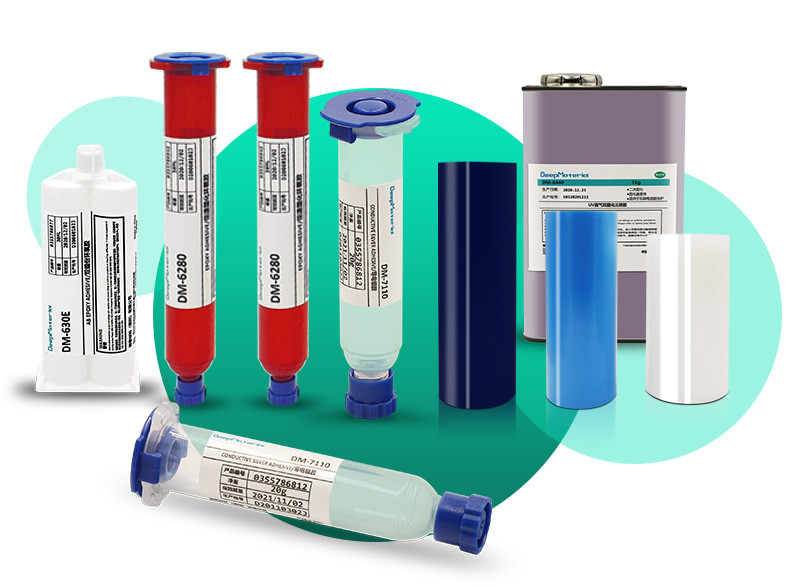
About Metal Bonding Epoxy Adhesive Manufacturer
Deepmaterial is industrial epoxy adhesive suppliers and epoxy resin manufacturers in china,manufacturing best strongest epoxy adhesive glue for metal to metal,plastic,glass and concrete,high temperature epoxy for plastic,industrial strength epoxy glue,best thermally conductive epoxy,low temperature epoxy adhesive,electronic epoxy encapsulant potting compounds and so on.
HIGH QUALITY ASSURANCE
Deepmaterial is determined to become a leader in the metal bonding epoxy adhesive industry, quality is our culture!
FACTORY WHOLESALE PRICE
We promise to let customers get the most cost-effective metal bonding epoxy adhesives products
PROFESSIONAL MANUFACTURERS
With industrial metal bonding epoxy adhesive as the core, integrating channels and technologies
RELIABLE SERVICE ASSURANCE
Provide metal bonding epoxy adhesives OEM, ODM, 1 MOQ.Full Set of Certificate
The Unseen Guardians: 5 Surprising Places Where Fire Retardant Materials Are Used
The Unseen Guardians: 5 Surprising Places Where Fire Retardant Materials Are Used When we think of fire retardant materials, our minds typically jump to obvious applications: the protective gear of firefighters, the insulation in our home walls, or the emergency blankets on an airplane. These are the frontline defenders, visibly...
The First Line of Defense: Top 10 Common Fire Retardant Materials Used in Construction
The First Line of Defense: Top 10 Common Fire Retardant Materials Used in Construction In the built environment, safety is paramount, and fire resistance stands as one of its most critical pillars. The devastating potential of fire extends beyond immediate destruction to loss of life, economic damage, and environmental harm....
Testing the Limits of The Super Fireproof Glue
Testing the Limits of The Super Fireproof Glue In the relentless pursuit of safer, more resilient infrastructure and technology, materials science has delivered a class of adhesives that seem to defy one of nature’s most destructive forces: fire. Dubbed “super fireproof glues,” these advanced polymers and composites are engineered to...
How to Choose the Right Fire Retardant Material for Your Project
How to Choose the Right Fire Retardant Material for Your Project In the intricate dance of modern engineering and design, few parameters carry as much weight as fire safety. It is a non-negotiable pillar, protecting lives, assets, and the continuity of operations. At the heart of this defense lie fire...
Revealing the Key Differences Between Fire Retardant and Fire Resistant in Fire Safety
Revealing the Key Differences Between Fire Retardant and Fire Resistant in Fire Safety A Matter of Life, Property, and Semantics In the realm of fire safety, terminology is not merely academic—it is a critical language that dictates material selection, informs building codes, and ultimately saves lives and property. Two terms that are...
Can a Glue Really Be Fireproof? The Science Behind The Super Glue
Can a Glue Really Be Fireproof? The Science Behind The Super Glue In our daily lives, we reach for adhesive products with remarkable confidence. From repairing a shattered ceramic mug to securing a loose tile, modern glues seem to possess almost magical bonding properties. Among them, cyanoacrylate—universally known as “super...


